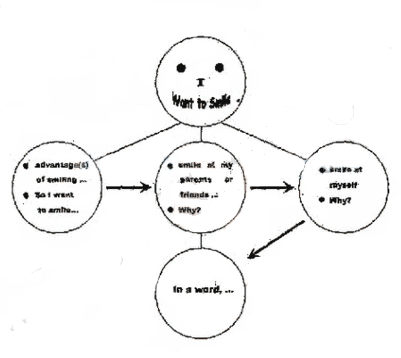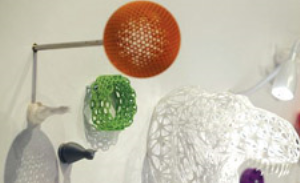

���� ������һƪ�����ģ�Ҫ����"��ҪЦ"Ϊ���ģ�д��Ц�����ֺô����Ե�һ�˳���д������ʱ̬Ϊһ������ʱ��1���������--Ц�кܶ�ô�����ҪЦ��
2��Ҫ�Ը�ĸ������Ц�Լ�ԭ��3��Ҫ���Լ�Ц�Լ�ԭ��4����С�ᣬ�ع����⣮
���㲿�� So I want to smile at all whenever and wherever possible�����߷־���һ������whenever and wherever possible������ʡ�Ծ�ʽ
Then my smile should go to myself��for only in this way can I gain more confidence in smiling my troubles away and live a better life�����߷־��Ͷ�������only+״�� ����ʹ�ð뵹װ
��� I Want to Smile
There are many advantages of smiling��It can not only make us happy��but also please others��If we smile at life��life will smile at us in return��So I want to smile at all whenever and wherever possible�����߷־���һ��
First��I would like to smile at my parents because they have given me life and taken all the trouble to bring me up��They arrange almost everything for me��With their help��I have made great progress��I would like to say"Thank you"to them with a smile��Then my smile should go to myself��for only in this way can I gain more confidence in smiling my troubles away and live a better life�����߷־��Ͷ���
In a word��let's greet every day with a smile��Tomorrow is another day��
���� Ӣ��д����һ�������Խ�ǿ�IJ����⣮����������ѧ����д���������һ�����ѧ����д���������ۺ��������Ե���������дʱҪע����ν��һ�£�ʱ̬��Ӧ���ô����еȣ�Ҫ���Ӣ��д��ˮƽ����Ҫ�������ѵ����һ�����Ի��������ѵ����Ҫ����ʵ����䡢����Ȼ����������ôʷ����䷨��֪ʶ�����ȷ����ľ��ӣ�����д��֪ʶ������ �����ѵ��������д������Ļ��������ͼ��ɣ�



| �꼶 | ���пγ� | �꼶 | ���пγ� |
| ��һ | ��һ��ѿγ��Ƽ��� | ��һ | ��һ��ѿγ��Ƽ��� |
| �߶� | �߶���ѿγ��Ƽ��� | ���� | ������ѿγ��Ƽ��� |
| ���� | ������ѿγ��Ƽ��� | ���� | ������ѿγ��Ƽ��� |
��Ŀ������Ӣ�� ��Դ�� ���ͣ��Ķ�����
 How do people traditionally manufacture �����죩 things��They usually start with a sheet of metal��wood or other material and cut��drill ���꣩ and shave it to create a desired shape��Sometimes��they use a mold ��ģ�ߣ� made of metal or sand��pour liquid plastic or metal into it and let it cool to create a solid part��
How do people traditionally manufacture �����죩 things��They usually start with a sheet of metal��wood or other material and cut��drill ���꣩ and shave it to create a desired shape��Sometimes��they use a mold ��ģ�ߣ� made of metal or sand��pour liquid plastic or metal into it and let it cool to create a solid part���鿴�𰸺ͽ���>>
��Ŀ������Ӣ�� ��Դ�� ���ͣ��Ķ�����
�鿴�𰸺ͽ���>>
��Ŀ������Ӣ�� ��Դ�� ���ͣ��������
| 25��A��amusing | B��annoying | C��surprising | D��confusing |
| 26��A��showing | B��telling | C��asking | D��teaching |
| 27��A��act | B��think | C��practice | D��predict |
| 28��A��when | B��where | C��why | D��how |
| 29��A��hold | B��influence | C��attract | D��discover |
| 30��A��meant | B��planned | C��arranged | D��did |
| 31��A��visited | B��joined | C��passed | D��called |
| 32��A��believed | B��guessed | C��learned | D��concluded |
| 33��A��temperature | B��quality | C��depth | D��surface |
| 34��A��until | B��though | C��unless | D��because |
| 35��A��creative | B��upset | C��puzzled | D��effective |
| 36��A��disliked | B��remembered | C��minded | D��considered |
| 37��A��history | B��change | C��sense | D��progress |
| 38��A��improve | B��pay | C��cancel | D��record |
| 39��A��businessmen | B��salesmen | C��customers | D��producers�� |
�鿴�𰸺ͽ���>>
��Ŀ������Ӣ�� ��Դ�� ���ͣ��Ķ�����
�鿴�𰸺ͽ���>>
��Ŀ������Ӣ�� ��Դ�� ���ͣ��������
| 16��A��illness | B��sorrow | C��wounds | D��fear |
| 17��A��Taking on | B��Holding on | C��Keeping on | D��Having on |
| 18��A��as | B��if | C��for | D��without |
| 19��A��part-time | B��full-time | C��simple | D��tough |
| 20��A��leave me | B��send me | C��get me up | D��bring me up |
| 21��A��gather | B��fill | C��order | D��give |
| 22��A��One by one | B��One after another | C��Hand in hand | D��Step by step |
| 23��A��healthy | B��happy | C��full | D��excited |
| 24��A��if | B��unless | C��after | D��until |
| 25��A��some | B��any | C��nothing | D��everything |
| 26��A��greet | B��comfort | C��encourage | D��connect |
| 27��A��player | B��student | C��kid | D��brother |
| 28��A��December | B��February | C��May | D��June |
| 29��A��wondered | B��stared | C��jumped | D��joked |
| 30��A��Where | B��When | C��Why | D��How |
| 31��A��brother | B��father | C��friend | D��mate |
| 32��A��So | B��Or | C��Nor | D��But |
| 33��A��spread | B��placed | C��threw | D��crossed |
| 34��A��met | B��acted | C��raised | D��knew |
| 35��A��form | B��blank | C��name | D��shoes |
�鿴�𰸺ͽ���>>
��Ŀ������Ӣ�� ��Դ�� ���ͣ��������
| 41��A��surprise | B��pleasure | C��relief | D��success |
| 42��A��meant | B��broke | C��ended | D��explained |
| 43��A��dream | B��future | C��plan | D��job |
| 44��A��received | B��doubted | C��heard | D��shared |
| 45��A��treatment | B��love | C��complaints | D��gifts |
| 46��A��needed | B��saw | C��failed | D��learned |
| 47��A��rude | B��grateful | C��amazing | D��cold |
| 48��A��office | B��school | C��garden | D��restaurant |
| 49��A��ring | B��thumb | C��luck | D��courage |
| 50��A��focus on | B��believe in | C��care about | D��know about |
| 51��A��language | B��expression | C��gesture | D��message |
| 52��A��reduce | B��feel | C��notice | D��cause |
| 53��A��devote | B��attach | C��introduce | D��drive |
| 54��A��ran | B��rode | C��walked | D��lived |
| 55��A��final | B��firm | C��great | D��unconditional |
| 56��A��refused | B��welcomed | C��passed | D��included |
| 57��A��so | B��but | C��because | D��if |
| 58��A��move | B��wait | C��help | D��pay |
| 59��A��important | B��busy | C��awake | D��alone |
| 60��A��both | B��everyone | C��nobody | D��few |
�鿴�𰸺ͽ���>>
��Ŀ������Ӣ�� ��Դ�� ���ͣ��Ķ�����
�鿴�𰸺ͽ���>>
��Ŀ������Ӣ�� ��Դ�� ���ͣ������
�鿴�𰸺ͽ���>>
����ʡ������Υ���Ͳ�����Ϣ�ٱ�ƽ̨ | �����к���Ϣ�ٱ�ר�� | ����թƭ�ٱ�ר�� | ����ʷ���������к���Ϣ�ٱ�ר�� | ������Ȩ�ٱ�ר��
Υ���Ͳ�����Ϣ�ٱ��绰��027-86699610 �ٱ����䣺58377363@163.com